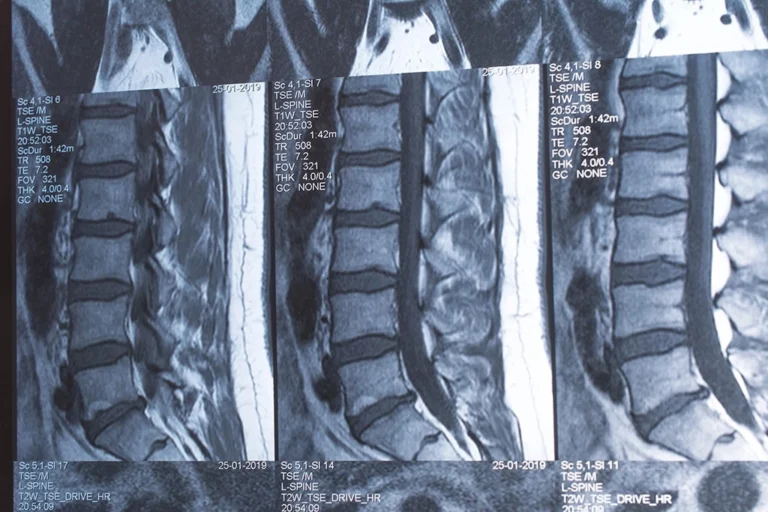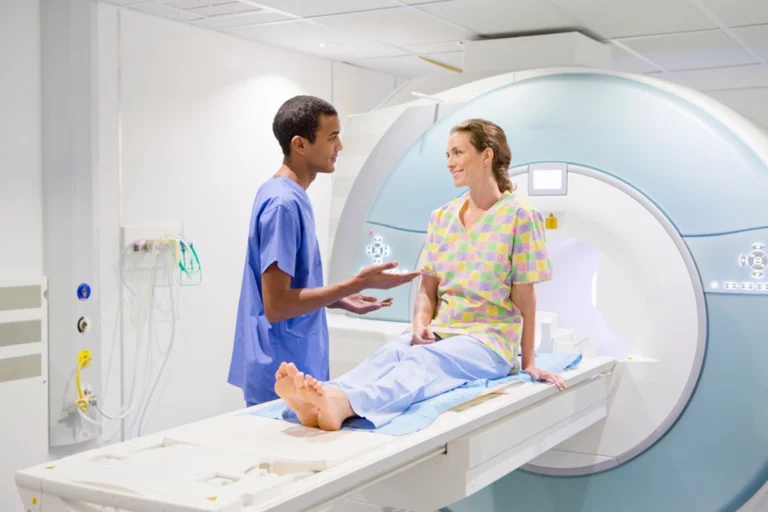So, your doctor recommended a back MRI. Getting a back MRI can come with a lot of unknowns from how to prepare to why your doctor ordered this scan, but keep reading to find the answers to your questions and the peace of mind you need. MRIs use magnets to produce detailed scans of your soft tissues and internal organs, nerves, and bones.
This scan is especially useful in diagnosing spinal issues or causes of lower back pain, something up to 80% of Americans will experience sometime in their lives. At South Jersey Radiology, we prioritize your needs over numbers, especially when it comes to preparation.
If you have had back pain for longer than 6-8 weeks or are having back pain with any of the following symptoms, you should ask your doctor about a back MRI:
- Fever
- Trauma or injury
- Bowel or bladder incontinence
- A serious underlying condition (ex: cancer)
Having any of these symptoms does not guarantee something is wrong.
Because of their high clarity and ability to take quality scans of soft tissue, a back MRI can be helpful in diagnosing or monitoring any of the following issues:
- Reason for back pain
- Damage after injury
- Effects on the spine after surgery
- Inflammation
- Spinal alignment
- Slipped or herniated lumbar discs
- Pinched nerves
- Abnormalities in the vertebrae or spinal cord
- Tumors
It is important to remember that just because your doctor has recommended you get a back MRI does not mean you 100% have one of these issues.
How Do You Prepare For A Back MRI?
Preparing for an MRI of your back or spine is the same as the way you would prepare for any other MRI. You can eat, drink, and medicate normally before your appointment unless your doctor has scheduled you for an MRI with contrast. If you are getting a scan with contrast dye (a solution to monitor blood flow), you should stop eating and drinking for 4 hours before your appointment. This is because the contrast needs movement to monitor what’s going on inside your body and reveal that on the scan. You should also arrive 15 minutes early to your appointment because extra time is needed to inject the contrast dye before your scan begins.
If you are anxious or claustrophobic about getting an MRI, talk to your doctor about alternative options like different machinery or sedation. SJRA offers wide-bore MRI machines as well as open MRI machines – both of which significantly lessen feelings of claustrophobia. If you opt to get sedated you will need to arrive early to your appointment and arrange for someone to pick you up after your scan is over.
What Do I Do Before A Back MRI?
On the day of your MRI back scan, try to limit your coffee or caffeine intake. Studies have shown that drinking too much coffee can give inaccurate MRI results because caffeine constricts your blood vessels, which limits blood flow. In order to get the most accurate results, talk to your doctor about how much coffee you can drink and when on the day of your scan.
Because the MRI machinery is at its simplest a big magnet, you must not wear anything metal during the scan. This means taking off any jewelry, watches, hearing aids, piercings, etc., and not wearing any clothing that has metal in it (zippers, buttons, an underwire in a bra, etc.). The best option for your MRI back scan is to wear loose, comfortable clothing without any metal in it. If you are wearing clothing that our technologist deems unfit for the MRI, you will be given a hospital gown to change into.
It’s also important to avoid wearing deodorant, makeup, and nail polish during your MRI. These items sometimes contain light metal that could alter the results of your scan or potentially hurt you because of the way the metal interacts with the MRI magnet. The safest option would be to avoid these items entirely.
Your doctor will go over your patient history with you before scheduling your MRI to ensure it is the best scan for you. This will include disclosing if you have any metal inside your body, like a pacemaker, aneurysm clips, implants, etc. If you have metal fillings in your teeth, these should not interfere with your MRI scan. However, some metal dental crowns might stop you from getting an MRI. If your crowns are made of porcelain, composite resin, or gold, you will be able to get an MRI. Make sure to be honest with your doctor as their goal is to get you the best possible help.
How Long Does A Back MRI Take?
When you arrive for your appointment, you will lie on your back on the metal bed that will slide into the MRI machine. The bed will slide feet first into the machine – a large donut-shaped magnet. Your whole body will typically be inside the machine, depending on what part of your back you are having imaged. If you are getting a lumbar MRI or a spinal MRI, you will be fully inside the MRI machine.
You can expect the scan time for your back MRI to vary depending on the sub-section being studied.
- Cervical Spine MRI: Average of 23 minutes
- Lumbar Spine MRI: Average of 22 minutes
- Thoracic Spine MRI: Average of 22 minutes
What Are The Differences Between An MRI & CT Scan?
Your doctor might recommend a CT scan of your back before your MRI. Because CT images can be captured faster than an MRI, they might be preferred in emergency circumstances. Although MRIs show the clearest images of soft tissue and make them perfect for scanning your back, CT scans can also offer clear images of the back and are a good alternative if you are too anxious to go into the MRI machine or if you have irremovable metal in your body. MRIs are a little safer than CT scans because they use magnets instead of ionizing radiation to capture the images.
MRI scans are the best diagnostic scans available, so they offer the best chance to discover what is causing your lower back pain. One drawback of an MRI, though, is that it is more expensive than a CT scan. The cost of an MRI of the back ranges from $1000 – $5000. For a lower back MRI, the average cost is $1300. For a lumbar spine MRI, the average cost is $1500. While these prices are steep, there are many ways to pay less while still getting more. Your insurance will likely cover the cost of your MRI if it is medically necessary. If you get your MRI done at an independent radiology center, like SJRA, you can pay up to 60% less than if you were to get your scan done at a hospital.
Spinal MRIs are expensive because the equipment, machinery, and employment surrounding them are expensive. But at SJRA we do not want cost to prevent you from getting the top-of-the-line care you need and deserve. We work with 99% of insurance plans and prioritize you, the patient, over our bottom line. Book your back MRI with SJRA at any of our following locations:
- Marlton (Greentree) Office – Marlton, NJ
- Medford Office – Medford, NJ
- Moorestown Office – Moorestown, NJ
- Mount Laurel Office – Mount Laurel, NJ
- Route 73 (Voorhees) Office – Voorhees Township, NJ
- Sewell (Washington Twp) Office – Sewell, NJ
- Turnersville Office – Turnersville, NJ
- Voorhees (Carnie Blvd) Office – Voorhees Township, NJ
- West Deptford Office – West Deptford, NJ
- Willingboro Office – Willingboro, NJ
Learn more about the board-certified, sub-specialized radiologists who read and interpret studies at SJRA, here.
Frequently Asked Questions
A back MRI is a diagnostic imaging technique that uses magnets to produce detailed scans of the soft tissues, internal organs, nerves, and bones in your back. It is especially useful in diagnosing spinal issues and causes of lower back pain.
Your doctor may order a back MRI if you have been experiencing back pain for longer than 6-8 weeks or if you have back pain accompanied by symptoms such as fever, trauma/injury, bowel/bladder incontinence, or to check for a serious underlying condition like cancer. It helps in diagnosing and monitoring various issues related to back pain, injury, spinal alignment, inflammation, slipped or herniated discs, pinched nerves, abnormalities in the vertebrae or spinal cord, and tumors.
To prepare for a back MRI, you can eat, drink, and take medications normally unless your doctor has scheduled you for an MRI with contrast. If contrast dye is involved, you may need to stop eating and drinking for 4 hours before the appointment. Arrive 15 minutes early if contrast dye will be used. If you experience anxiety or claustrophobia, discuss alternative options like different machinery or sedation with your doctor. Avoid excessive caffeine intake on the day of the scan. Remove all metal objects, including jewelry and clothing with metal components. Avoid wearing deodorant, makeup, and nail polish, as they may contain metal.
The duration of a back MRI can vary but typically ranges from 15 to 90 minutes. You will lie on a metal bed that slides into the MRI machine, which resembles a large donut-shaped magnet. Your whole body or the specific area being scanned will be inside the machine. You will need to hold still during the scan.
While both MRI and CT scans can provide clear images of the back, there are some differences. CT scans are faster and preferred in emergency situations, but they use ionizing radiation. MRIs use magnets and don’t expose you to radiation. MRIs produce the clearest images of soft tissue and are ideal for scanning the back. However, CT scans are a good alternative for individuals with metal implants or those who experience anxiety in enclosed spaces. MRI scans are generally more expensive than CT scans but offer better diagnostic capabilities.
You can schedule your back MRI appointment at any of the following locations:
• Marlton (Greentree) Office – Marlton, NJ
• Medford Office – Medford, NJ
• Moorestown Office – Moorestown, NJ
• Mount Laurel Office – Mount Laurel, NJ
• Route 73 (Voorhees) Office – Voorhees Township, NJ
• Sewell (Washington Twp) Office – Sewell, NJ
• Turnersville Office – Turnersville, NJ
• Voorhees (Carnie Blvd) Office – Voorhees Township, NJ
• West Deptford Office – West Deptford, NJ
• Willingboro Office – Willingboro, NJ
Our team of board-certified, sub-specialized radiologists reads and interprets all our MRI scans. You can learn more about them by visiting our physicians’ profiles.




